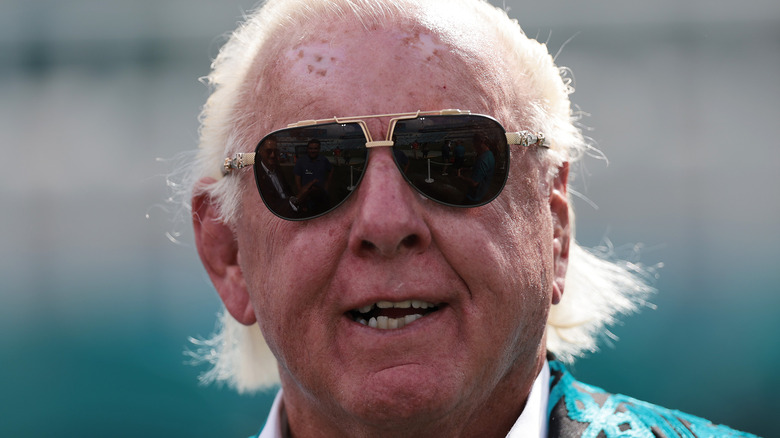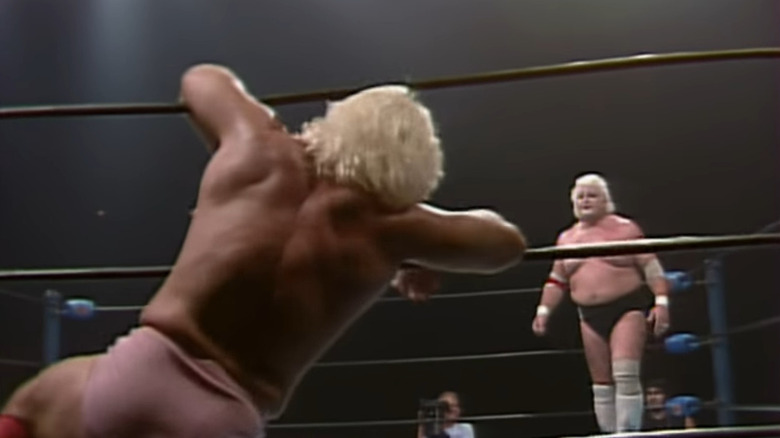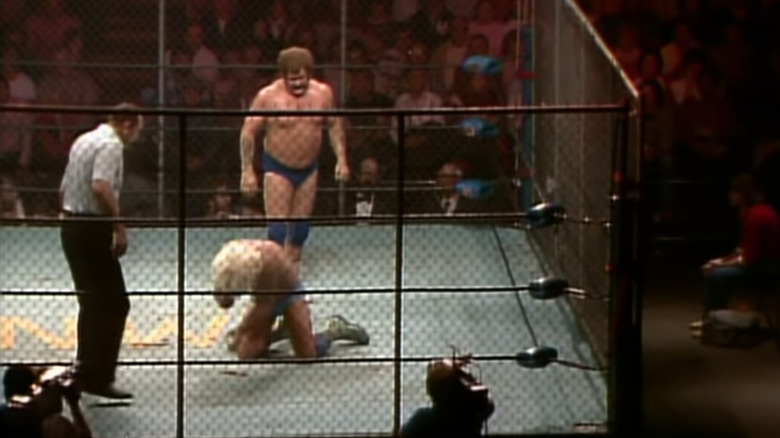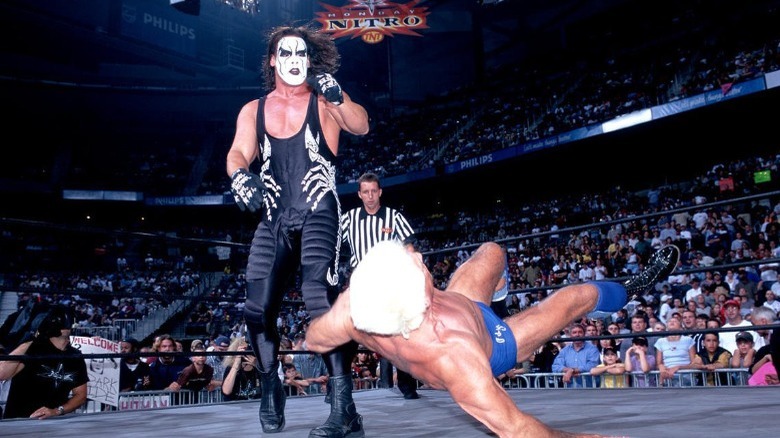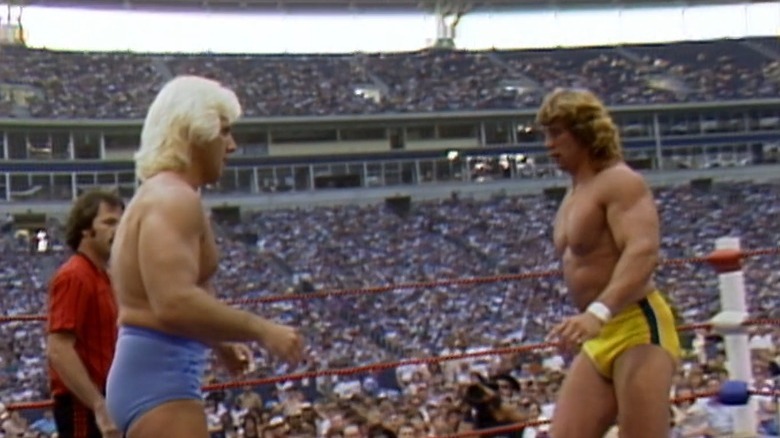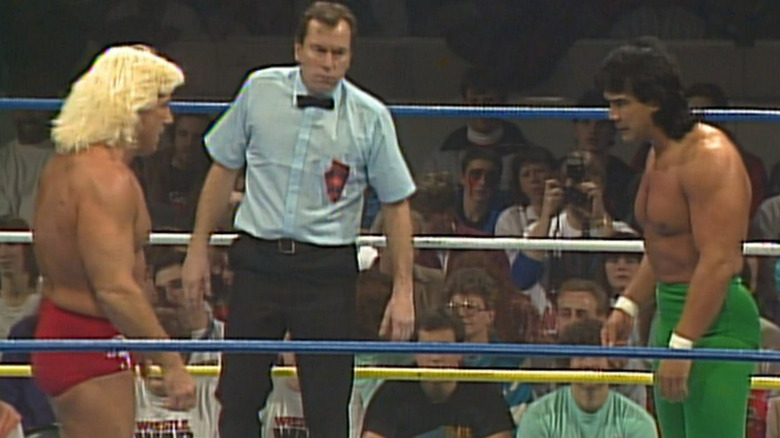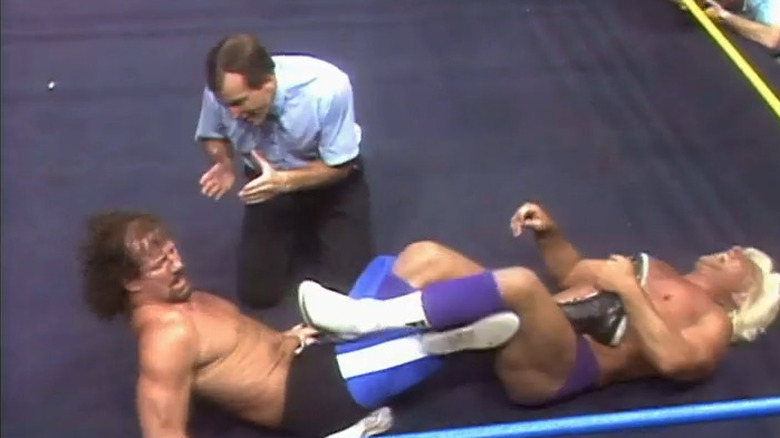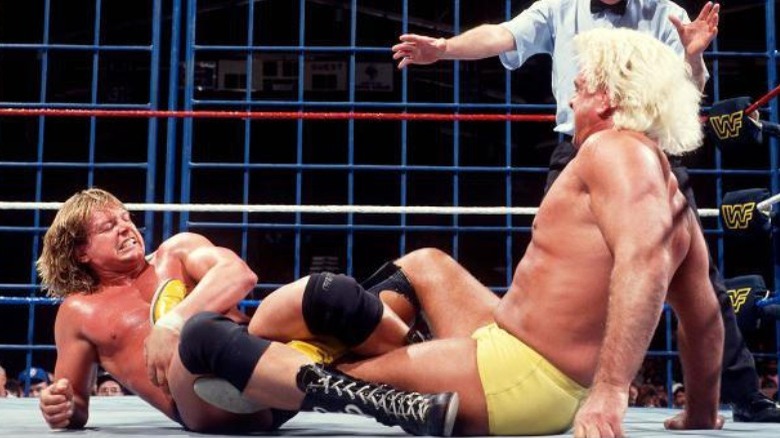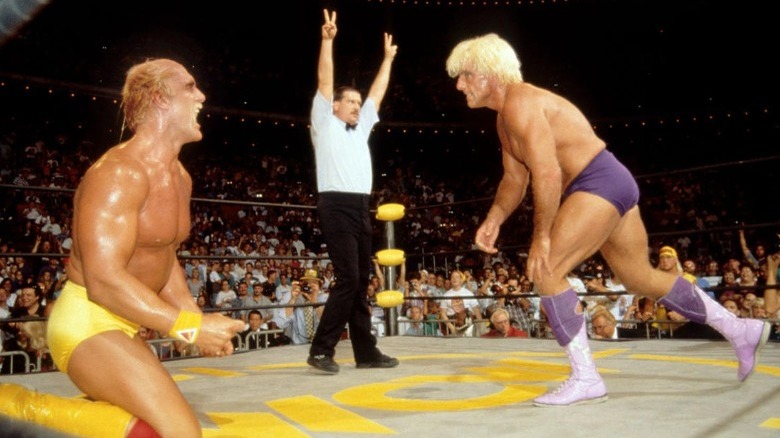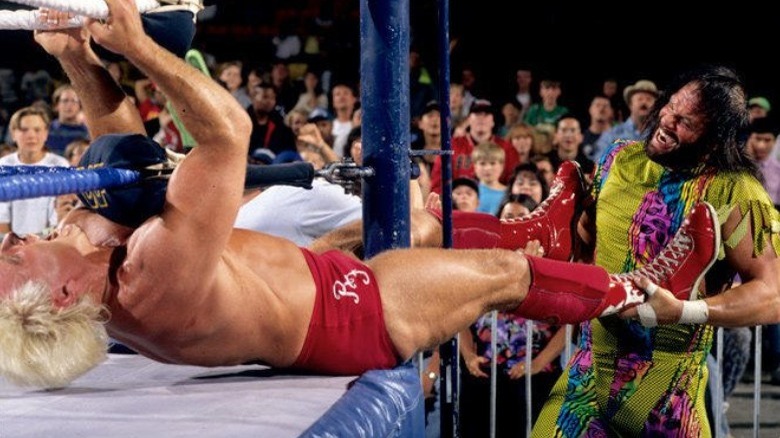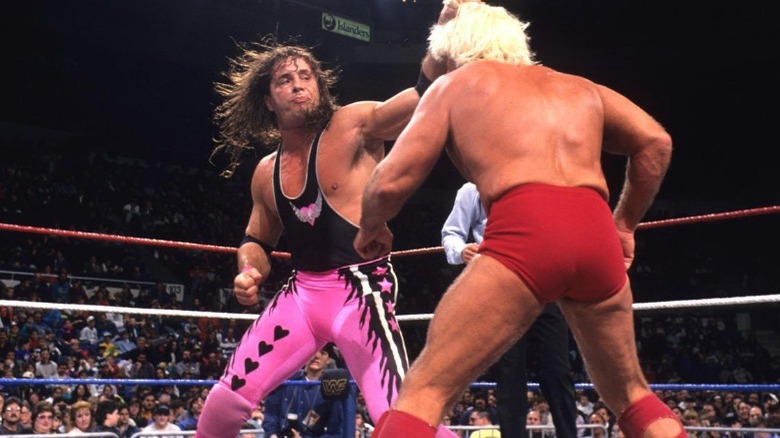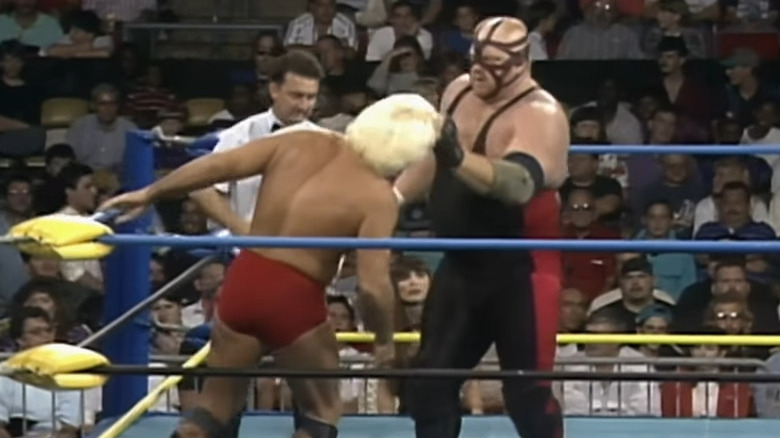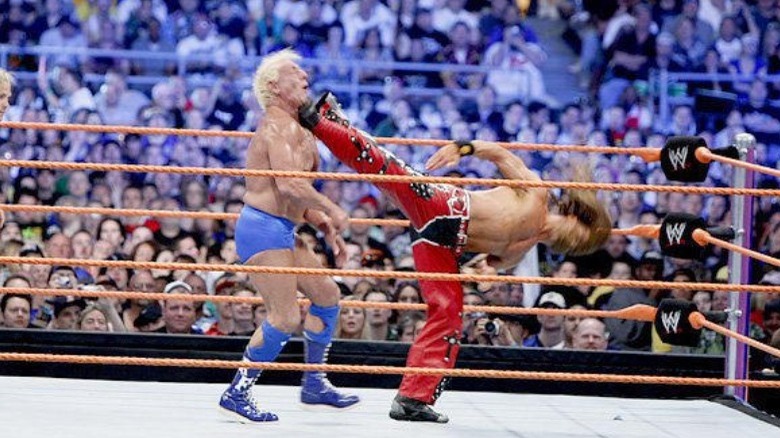12 Most Memorable Ric Flair Opponents Of All-Time
We may receive a commission on purchases made from links.
When you've wrestled in six different decades, chances are you've racked up your share of rivals. When you're one of the biggest wrestling stars of all time, chances are your cup is overflowing with legendary ones. A top name the world over, from the territories to WCW to WWE, Ric Flair has a laundry list of incredible opponents and we're crazy enough to try to pick the top 12.
First, though, we'd first like to note some honorable mentions that just missed the cut. From a match quality standpoint, Barry Windham was perhaps one of the best opponents Flair ever had (although you can skip their 1993 stuff). Former Four Horseman Lex Luger was one of Flair's top rivals in the late '80s into the '90s. Mick Foley and Ric had a legit war of words through their autobiographies before they turned it into a wild in-ring feud. We're also not counting non-wrestler opponents like Eric Bischoff and Vince McMahon. Even with all that, we know we're still leaving out some worthy names apart from even these men, but we only have so much time and space, so let's move on to the dirtiest player in the game's dirty dozen.
Dusty Rhodes
Before they were opponents, Dusty Rhodes was actually Ric Flair's hero. Go look up photos of Ric early in his career and you'll see a much bulkier Flair, more reminiscent of the American Dream. The emulation went further than size though, with Rhodes describing in his autobiography "Dusty" a time where Flair went so far as to ask him if he could work as Dusty's cousin, Rambling Ricky Rhodes. Dusty instead encouraged Flair to find his own character and over time Ric did just that, crafting his own high-life living, wealth-flaunting version of Buddy Rodgers' Nature Boy persona.
It was a perfect contrast to Rhodes' common man, "Son of a plumber" image, and the two spent the majority of the '80s feuding with each other. Flair's first NWA World Title win came from defeating Rhodes, and the two would trade the belt back and forth some more a few years later. In many ways, Dusty Rhodes vs. Ric Flair was the defining feud of Jim Crockett Promotions. The feud also took place behind the scenes as well though, with Dusty's dual role as both booker and top star creating some real-life friction between the two men. In his own autobiography, "To Be The Man", Flair acknowledged the tensions between them, but added, "whenever I think of Dusty, the good will always outweigh the bad."
Harley Race
Another of Flair's legendary '80s rivals, Harley Race would actually be the man Ric surpassed when he claimed the record for most reigns as NWA World Heavyweight Champion, a position he holds to this day, with 10 reigns to Harley's eight. Harley was a bit of a precursor to Flair in many ways, another big action, hard bumping champion. Like with Dusty, Ric would trade the title back and forth with Race multiple times. Of all their matches, none will live on like their bout that main evented the very first Starrcade in 1983.
Subtitled "A Flair for the Gold," the supercard was centered around Flair regaining the belt from Race, this time in a steel cage. The match had an excellent build, with Harley putting out a $25,000 bounty on Ric and Flair recovering from what was sold as a career-threatening injury. An even bigger battle took place behind the scenes, as recounted in "To Be The Man" – Vince McMahon offered Race a quarter of a million dollars to sign with the WWF, take the title with him, and no-show Starrcade. Harley, to Flair's eternal appreciation, declined the offer.
Sting
Flair's ability to get the most out of developing young talent was on full display when he first started to work with Sting. Seen as a bright prospect with good charisma, some physical tools, and a fantastic physique, Flair was able to have some of Sting's first great matches, a few which still stand as career highlights for both men. If you think it's too forward to say Ric Flair had a huge hand in making Sting a star, just know that the Icon himself disagrees with you. During a pre-show promo for Ric Flair's Last Match in 2022, Sting credited Flair for putting him on the map and said he "would have never made it how far I did" without him.
Two matches in their feud bookended an era. The match that in many ways made Sting a star was their 45-minute draw that main evented the first ever Clash of the Champions special in 1988. Fast-forward to over a decade later and in 2001 Sting and Flair found themselves main eventing another show, the final ever episode of "Nitro". It is almost too fitting that two of WCW's most important stars began one long-running institution and ended another.
Kerry Von Erich
As NWA Champion in the '80s, one of Flair's major responsibilities was to travel to all the NWA territories, defending the title against each promotion's local stars. For a few years during that decade, there may not have been a hotter territory than World Class Championship Wrestling. WCCW was built around Fritz Von Erich and his many sons, primarily David, Kerry, and Kevin. While David was seen as the best all-around talent and having a mind for the business, Kerry was seen as the one with the most charisma, the best body, and a look women went crazy for.
Kerry and Ric worked together not just in WCCW's home state of Texas, where they drew huge gates, but in places like Hawaii and even Japan. Their biggest match, and quite possibly the biggest match ever in WCCW, will always be the main event of the David Von Erich Memorial Parade of Champions. Drawing over 32,000 fans to Texas Stadium for a tribute to the recently deceased David, Flair dropped the NWA title to Kerry in front of an ecstatic crowd. Kerry would lose the title back to Flair less than three weeks later, a short-lived career highlight for both Kerry and WCCW as a whole.
Ricky Steamboat
When it comes to Flair's greatest opponent from an in-ring perspective, there can be no debate, it's Ricky Steamboat. Flair himself has frequently called Ricky the greatest babyface of all time. Much like Dusty Rhodes, Steamboat was the polar opposite of Flair, the wholesome family man to Ric's hard-partying hedonist. Their matches span from the late '70s to the mid-'90s, with Flair in "To Be The Man" estimating that the number of matches they had against each other is in the low four-figures. The two men had the kind of chemistry that can only come when two incredibly talented performers work with each other night after night for years.
Flair claims some of their best matches against each other came in 1978, and Dave Meltzer of the Wrestling Observer gave an untelevised match between the two one of his early (albeit unofficial) six star ratings. But in terms of what was officially broadcast, their fabled trilogy of matches in 1989 will do just fine. Taking place over a Clash of the Champions and two PPVs, the trio of bouts is considered by many to be the greatest three matches of all time. The trilogy saw each man win one match and draw a third in total, but with Flair taking his win at the end of the feud, he came away with the title.
Terry Funk
1989 is considered to be one of Flair's career years. That is partly due to the Steamboat feud, but it's also due to the feud that followed it. Immediately after the final match of the Steamboat trilogy, Terry Funk asked Flair for a title shot. When Flair started to talk about Funk jumping the line of contenders, Terry viciously attacked him. The segment famously included Funk piledriving Flair on a table (that didn't break), during an era where that was less commonplace than it would be some years later. The Funker, someone who is a legit contender for the greatest wrestler ever in his own right, had been largely retired since late '87 but was back with a vengeance.
Funk and Flair would work many matches over the rest of the year, some on TV, many on house shows. The feud intensified with another famous angle where Funk suffocated Flair with a plastic bag. According to Jim Cornette, TBS was none too pleased with an angle some felt was pushing boundaries for the product. The war culminated in their two most prominent and well-remembered matches, their PPV bout at Great American Bash '89 and their feud-ending "I Quit" match at a Clash of the Champions. Flair won both and, when all was said and done, the only things holding these matches from topping more match of the year lists were the fact that the Steamboat bouts that preceded them were just that good.
Roddy Piper
When Flair jumped to the WWF, an old friend was waiting for him. Roddy Piper and Flair had faced off against one another dozens upon dozens of times in the early '80s, and occasionally teamed up. Flair even lost what would end up becoming the WCW US Title to Roddy in '81. Flair, so often the heel during this era, was at times the babyface in their struggles. If there was a wrestler who could match Ric in terms of being hatable, it was Piper, someone Flair himself has called, "the greatest bad guy in the history of the business."
But when Flair joined the WWF years later, the roles were reversed. Piper was now a babyface and Flair was the villain invading his home turf. Piper became Ric's first regular opponent in the WWF and one of his major rivals for his relatively short run there. In 2006, their careers would take one late, weird twist together, as they won the WWE Tag Team Titles from the Spirit Squad at the Cyber Sunday PPV. The reign only lasted a few weeks before being ended by Rated RKO, but served as a sweet coda to an inside-the-ring rivalry and out-of-the-ring friendship that spanned decades.
Hulk Hogan
For years, you had two huge pillars of wrestling. There was Ric Flair, the NWA/WCW hero to the hardcores, the traditional ideal of a pro wrestler. Then there was Hulk Hogan, the modern crossover cultural phenom, leading WWF's new, more cartoonish, physique-oriented wrestling to huge success. Fans spent well over half a decade comparing the two and debating them against each other. When Flair came into the WWF in '91, a feud seemed assured, yet in the ring it never made TV or PPV and was instead confined to house shows. Flair claims in "To Be The Man" that the original plan for WrestleMania VIII was him against Hogan before the WWF changed their minds.
Their feud would be revived and get the prominence it deserved in 1994, when Hogan joined Ric in WCW. The July 5, 2004 Wrestling Observer says that Flair actively recruited Hogan to make the jump. When he did, their feud was Hulk's welcome to the company. Hogan's first match in WCW saw him defeat Flair for the WCW World Heavyweight Title at Bash at the Beach. This was followed by Hulk beating Flair against at a Clash of the Champions and a third time in a cage, what ended up being Flair's first of multiple retirement matches, at Halloween Havoc.
This time, with a stronger focus and build, their feud did great business. It would be a feud that WCW would revisit time and time again, in various forms, for the rest of their history. Even when WCW died, Flair and Hogan found opportunities to bring it back, sometimes only briefly, in WWE, TNA, and even an independent tour of Australia.
Randy Savage
If Hogan was the early '90s WWF feud everyone was disappointed Flair didn't get, Savage was the feud of the era we were happy he got. With fans' dreams of a Hogan/Flair WrestleMania main event evaporating, Savage stepped up to the plate as the babyface to dethrone a title-holding Slick Ric. The leadup to the match was built around Flair sparking untrue rumors of a relationship with Savage's love, Elizabeth, all thanks to some edited photos. The feud was hot enough that it continued far after Mania, with Flair eventually regaining the title from the Macho Man months down the line.
Like the Hogan feud, Savage would rekindle his hatred of Flair when he jumped to WCW in the mid-'90s. They would wage battle from '95 into '96, with the WCW World Title jumping from Savage to Flair to Savage and finally back to Flair. Randy's father Angelo Poffo even got in on the action, getting put in the figure four by Ric at Slamboree '95. Many do not remember that before the nWo, it was this feud that started heating up WCW on its way to starting the '90s wrestling boom. As Dave Meltzer wrote in his obituary of Savage in the Wrestling Observer, "WCW had been doing terrible house show business, even with Hogan, in 1994 and 1995. The turnaround in WCW business can be traced to early 1996, and the Flair vs. Savage feud, with Elizabeth thrown in."
Bret Hart
Yet another famous Flair feud that was started in WWF and rekindled in WCW years later, this one took place outside the ring as much as within it. Bret Hart's first reign with the WWF World Title came from defeating Flair in 1992. The match was considered very good, but maybe not at the level you'd expect from two men of their caliber. The same happened years later in WCW when a newly arrived Bret wrestled Flair at Souled Out '98, winning once again. There was just something about the chemistry that wasn't quite there.
Some light was shed in subsequent media interviews from both men, as well as their autobiographies. In "To Be The Man" Flair says that he "never saw dollar signs on Bret Hart" and criticized his inability to break from a pattern. In Hart's own autobiography, "Hitman," Bret offered that he too found Ric overrated, stating, "As a technician Flair was one of the best, but I was baffled by how little he really knew about building a great match." The vast majority of fans would agree that both men were top talents, yet each had a significant critic in the other due to their different approaches to working. Over the years, fences were mended, and you could catch Hart in the front row of Flair's last match in 2022, cheering Ric on along with the Undertaker and Mick Foley.
Vader
Once Ric returned to WCW in 1993, at the end of the year one challenge awaited him, Vader. One of the biggest, most intimidating wrestlers of the era, with a reputation for being stiff at times, people wondered how a now well into his 40s Flair would work with him. It turned out the answer was pretty good. Flair's triumph over Vader at Starrcade '93 in a match that risked Ric's career for a shot at Vader's WCW World Title is seen as not just a great match, but a great show-long story. Throughout the night we got to see a different side of Flair, saying goodbye to his family and somberly talking about the stakes of the match with "Mean" Gene Okerlund.
The rematch in 94 at Superbrawl also delivered, and a year later, as often happens in wrestling, alliances changed and a now heel Flair would team up with Vader in an attempt to get revenge on Hulk Hogan. But it's that Starrcade match that was the special moment, the last time it felt like a promotion was putting Flair in the absolute top spot of their company and expecting him to carry the whole thing. In front of his adopted hometown crowd of Charlotte, North Carolina, for one more day, Ric Flair truly felt like the man the wrestling world revolved around.
Shawn Michaels
Ric Flair had retired before Shawn Michaels, and he would retire again after Shawn Michaels, but of all of the times he said goodbye, none were as dramatic as the Heartbreak Kid vs. The Nature Boy at WrestleMania XXIV. Closing in on 60 years of age, Flair started an angle where Vince McMahon decreed that the next singles match Flair lost by pinfall or submission would be his last. It created great drama, as Flair then went on a win streak, building anticipation for the final match fans knew had to be coming soon.
That match came at WrestleMania, against Michaels. Flair couldn't physically do as much as he used to do, but the drama of the night was incredible. When the match ended with a teary-eyed and exhausted Flair telling Shawn to put him away, and Shawn famously saying, "I'm sorry, I love you" before delivering a final superkick, it seemed like a perfect way to end one of the greatest careers in wrestling. Unfortunately, the retirement was not long for this world, as Flair returned to the ring outside of WWE before the end of the following year. Still, no matter how many times Flair decides to call it a day, none of them, not before or since, capture the magic of this one night.
